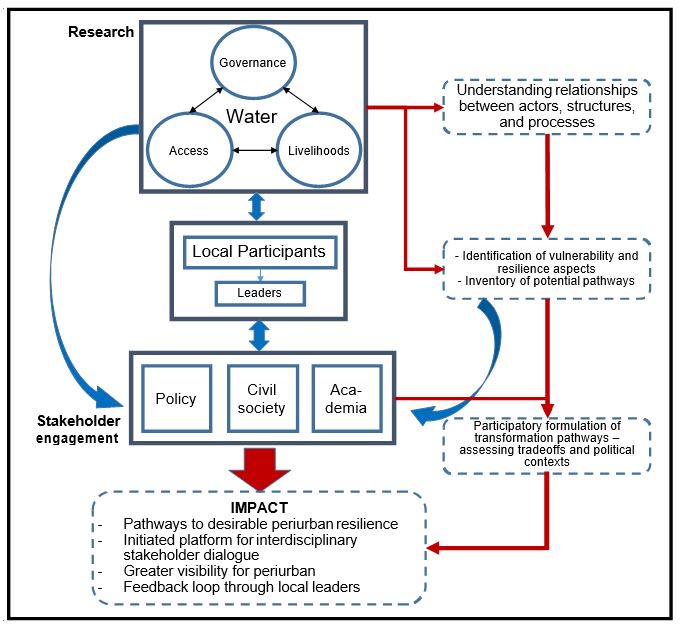About the Project
"H2O - T2S in urban fringe areas" aims at understanding how transformation processes in urban fringe areas of Indian metropolises influence the access to water as a consumption good and a resource for livelihoods. The significance of this research question arises from the fact that urban fringe areas in Asia (and Africa) are currently undergoing fundamental transformations, with most of the urban growth occurring in these parts of the world. The periurban areas are either transformed into urban areas or the growing cities indirectly induce changes on their surroundings since they are relying on their ecosystem services.
The project analyses transformation processes in urban fringe areas of Indian metropolitan cities. It aims at understanding how access to water as a consumption good and a resource for livelihoods is changed during the urbanisation process in periurban spaces. The project is structured around 4 research objectives: (1) understanding institutional change of water governance, (2) analysing changing access to water with changing societal structures, (3) analysing livelihood changes during the urban transformation and the resulting changing water demands; (4) Co-developing transformation pathways for sustainable water management in urban fringe areas.
The project is designed as a multi-sited multi-method field study comparing the urban fringe areas of Kolkata, Pune and Hyderabad. Through its design, the research contributes understanding into the drivers of vulnerability and resilience of periurban communities, and helps to identify more sustainable future pathways. The project aims at initiating a stakeholder dialogue in all of the three research areas. Workshops will include government agencies, local communities and key scientific experts that bring in further knowledge needed in addition to the knowledge generated by the project researchers.
The project generates new insights on how urbanisation processes take place in India. It identifies pathways towards the development of sustainable future cities as part of the stakeholder dialogue. It contributes to the knowledge on the sustainable use of water as an increasingly scarce resource.
Duration and Funding
The project extends over 3 years from September 2018 - August 2021. It is implemented by a consortium of three partners - SaciWATERs (Lead PI) in india, University of Cologne (UoC) Germany, and Delft University of Technology (TUDelft) Netherlands. Field partners for the project are - The Researcher (Kolkata) and Bharati Vidyapeeth Deemed University Pune.
The project partners are funded jointly by International Science Council (ISC), German Federal Ministry of Education and Research (BMBF), and Netherlands Organisation for Scientific Research (NWO). The project is one of 12 projects under the programme "Transformations to Sustainability" jointly funded by the consortium of funders under the NORFACE-Belmont Forum.

